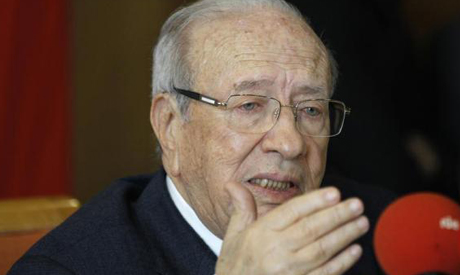
File Photo: Beji Caid Essebsi, leader of the Nidaa Tounes (Call of Tunisia) secular party, speaks during a news conference in Tunis February 19, 2014 (Photo: Reuters)
Residents of Tunisia's lower governorates took to the streets on Friday after presidential candidate Beji Caid Essebsi said supporters of his challenger in next month's run-off vote were radical Islamists.
In an interview this week with a French TV station, Essebsi said that interim president Moncef Al-Marzouki was the candidate of "jihadist Salafists".
Essebsi's main voting bloc is in the north, as well as the central-eastern Al-Sahel area.
Voting for the first round of the presidential election earlier this week saw Essebsi take 42 percent of the votes, while Al-Marzouki garnered 22 percent and leftist candidate Hamma Al-Hammami finished third with 10 percent.
In response to his comments, southern cities – which mostly voted for Al-Marzouki – protested on Friday, calling the statements insulting and divisive.
Southern Tunisia contains some of the most undeveloped cities in the country.
Protests against Essebsi started on Wednesday night in the cities of Kairouan, Medenine and Ben Gardane.
But Essebsi was defended by the political party he heads, Nidaa Tounes, which won the majority of seats in October's parliamentary polls.
Al-Tayyeb Al-Bakoush, Nidaa Tounes's secretary-general, released a statement saying that Essebsi's comments had been "interpreted out of their context."
Al-Bakoush further accused Al-Marzouki's Congress for the Republic Party of "attempting to divide the country between the north and the south" and warned of an "unprecedented polarisation" in Tunisia's southern cities.
For his part, Al-Marzouki denied calling for protests on Friday. His presidential campaign published a statement asserting it wanted to avoid "further tensions at such a stage" ahead of the runoff vote in December.
Tunisia's political parties and civil groups will meet on Tuesday to discuss the issue.
Ennahda, which finished second behind Nidaa Tounes in the parliamentary elections, published a statement in its Al-Fajr newspaper signed by the Islamist movement's head, Rached Ghannouchi, in which he urged Essebsi and Al-Marzouki to avoid "provocation and accusations."
The statement warned against "threats of dividing Tunisians on the basis of political affiliations."
Meanwhile, Hamadi Al-Jebali – former premier and Ennahda leading figure – accused Essebsi of "calling for discrimination" and called on him to apologise in public and abide by the constitution.
Short link: